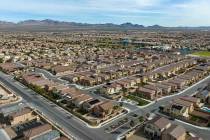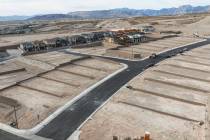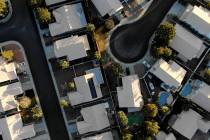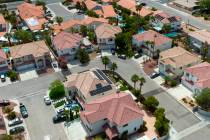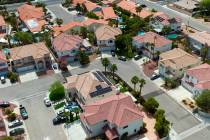Clark County commission OKs $4 million in federal funds to buy, rehabilitate, resell homes
A rolled-up, yellowed newspaper lying in the driveway of the empty house is dated weeks ago.
It won’t be read anytime soon.
The people who used to live on Cagney Court left long ago, fleeing their crumbling finances delivered by a local economy that has seen the highest bankruptcy, unemployment and foreclosure rates in the nation.
Clark County commissioners on Tuesday funneled $4 million in federal neighborhood stabilization program third-round funding to Housing for Nevada, a nonprofit that aims to buy, rehabilitate and resell foreclosed or abandoned detached single-family homes to qualified homebuyers.
In this case, the group plans to target at least 25 foreclosed or abandoned homes in the Winchester area, which is bordered by Eastern Avenue and U.S. Highway 95 between Sahara Avenue and Desert Inn Road.
Rehabbing the properties includes adding performance-based energy-efficient improvements to the homes to reduce utility costs.
The funding will be used to help only eligible households that are at or below 120 percent of the area median income adjusted for family size. The area median income is about $61,000 per year. Once sold, the property must be occupied by the participant and cannot be subleased.
Housing for Nevada, the nonprofit developer, helps low- and moderate-income families become first-time homeowners. The group also considers licensed contractors, appraisers and Realtors who apply with the nonprofit to participate in the project.
Target areas are determined by a combination of factors, which include census data, income and transportation corridors where families might have only one vehicle.
REACTIVE RATHER THAN PREVENTATIVE
But Commissioner Chris Giunchigliani, who represents the Winchester area, said the federal government missed an opportunity in creating a program that prevents people from losing their homes rather than a reactive one once a family has lost its house.
"It’s nonsensical, but that’s the way it came down," she said.
The federal program is part of the Housing and Economic Recovery Act of 2008. The third phase of funding is authorized under the Dodd-Frank Act of 2010, which provides neighborhood stabilization grants to all states and select governments on a formula basis.
For the most part, the county relies on juvenile offenders who have been ordered to help clean up properties through community service or private contractors to clean up abandoned properties, many of which are foreclosed. It places a lien on the home, and the property owner or buyer must pay some or all of those costs.
Under the grant program, as much as $14,999 in homebuyer aid will be available to each buyer to be used for down payment assistance, mortgage principal payments and closing costs for the purchase of the home.
The foreclosed or abandoned detached single-family home must be discounted 1 percent from the current market appraised value within 60 days of the final offer and must not have been occupied by a tenant during the preceding 90 days.
The homebuyers are required to have gone through education and counseling, had their loans approved and be searching for a home.
The nonprofit already spent $5 million of phase one funding on 31 homes in and around the Spring Valley area, including the Cagney Court residence, which is on the market. Around the corner, another home on Ganado Drive was remodeled and sold a few months earlier. Twenty-four of these homes have been sold. The remaining seven are expected to be complete within the next two months, county officials said.
‘A DROP IN THE BUCKET’
But even the nonprofit folks are worried about the effectiveness of the Acquisition Rehabilitation Program. The maximum budget for rehabbing each property is $50,000, and the Winchester area has older housing where lead testing is required for some homes, said Christine Johnston, Housing for Nevada CEO.
"Overall, this is a drop in the bucket," Johnston said. "There are not enough federal funds to make this program a huge success. … If we could somehow get a program going that was not just federally funded, maybe private dollars would go into it. You (could) make a huge difference. We could fulfill what neighborhood stabilization was supposed to do."
That means changing the neighborhood by cleaning up the property and influencing neighbors to take responsibility for their own homes.
"Our first goal is to take foreclosures off the market to clear up the foreclosure problem we have in all these empty homes," Johnston said. "Then we put qualified buyers in them to make them sustainable. Since the buyers are doing the rehab according to what we have, it allows (homeowners) a longer period of time where they can afford the house without having major repairs."
One neighbor, who lives at the end of the cul-de-sac down the street from the empty Cagney Court residence, said the program was a waste of money because the recently renovated home was still vacant a few months after repairs were made.
"It doesn’t look too much different, to be honest," said the man, who refused to give his name. "Nothing changed. It’s still empty. The money they spent on it was a waste to me."
Rows of tired apartment complexes and smaller homes sit at the intersections of Karen Avenue at Artic and Atlantic streets, part of the targeted Winchester area. Neighbors in the surrounding housing said they would welcome the program in hopes of breathing life into the area.
"Our goal is to get as many (properties) as possible," Johnston said, adding, "There’s just not enough federal funding, and I think that’s across the country."
The County Commission also approved $1.8 million in phase three funds to Consumer Credit Counseling Service and $750,000 in phase three funding to Nevada Partners Inc. to administer homebuyer aid programs for the target area.
Contact reporter Kristi Jourdan at kjourdan@reviewjournal.com or 702-455-4519.









